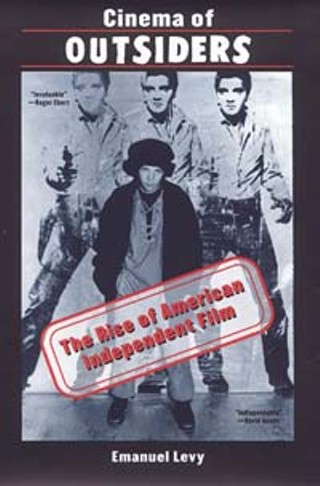Cinema of Outsiders: The Rise of American Independent Film
Reviewed by Marc Savlov, Fri., March 10, 2000

Cinema of Outsiders: The Rise of American Independent Film
by Emanuel LevyNew York University Press, 660 pp., $34.95
Everywhere these days, the sobriquet "indie" seems to be the new mantra. That friendly little abbreviated form of "independent" is dropping from lips across the land and landing square on the cultural zeitgeist like dollar bills raining on the Blair Witch team. Indie this, indie that, but most of all, indie film. So what is an independent film, and what hallmarks, history, and histrionics are wrapped up in the vowel-heavy term? Emauel Levy, Variety's senior film critic and longtime film scholar, tackles that admittedly tough question in the weighty Cinema of Outsiders and offers the best (so far) definition of what, exactly, we're all so excited about, and why.
Levy's task is a daunting one, to say the least: There are, of course, no firm rules as to what makes a work independent or not. The generally accepted guidelines -- that an indie film be produced out of the mainstream Hollywood system -- are easy enough, but the term (and the lifestyle that it emcompasses, a cineaste's take on the old punk rawk DIY credo), is more complex. (Levy quotes True Love director Nancy Savoca to this effect in the introduction: "Independent film is really a way of thinking," she says. "I used to think it was about where the money comes from, but now it's clearly about having a vision and a point of view when you want to tell a story." Too true.)
Levy jumps in right at the fore and lays down his guidelines, noting that many people use Steven Soderbergh's 1989 bombshell sex, lies and videotape as the indie shot heard 'round the world, but wisely opting to go back a bit further to begin at 1977, the year of Eraserhead, Desperate Living, and Welcome to L.A. (among others). From there on, Levy's book doesn't so much break down the indie theorem (which brings to mind the auteur theory as well) as bring it all together. Chapters on cinematic outsiders such as Jon Jost, David Lynch ("Jimmy Stewart from Mars" Levy calls him), Soderbergh, John Sayles, and John Waters collide with bits on the new cinema of noir (John Dahl, whose startling 1994 opus to bad blood in worse towns, Red Rock West, caught everyone off-guard), the new queer indies (Gregg Araki, et al.) and musings on Hal Hartley, John McNaughton, and well, just about anyone else you'd care to name.
Levy is, if nothing else, thorough in his research and scope, and Cinema of Outsiders positively bristles with names, dates, and thoughtful asides on films that have shaped so many modern lives and lifestyles that it's boggling they're all actually in here. The only point I took with Levy (and admittedly, it's a minor one) is in his writing style. In the book's preface he notes that his career began in academia, though he's written this book not for the scholars and film professors but instead for those of us who go to movies more than most, the fans. His tone, though, shifts from time to time into the dry areas of academe, and though that's not much of a quibble, a more conversational tack might have suited the indie milieu better. That aside, Levy has managed a remarkable feat, roping in 23 years of cinema that matters as much now as it did whenever it was released and simultaneously provides a window into our own indie-mad culture. That's a job well done by anyone's standards.
Emanuel Levy will be moderating "American Mavericks: Monte Hellman" on Saturday, March 11, at 11am at the SXSW Film Conference.
On Sunday, March 12 at 1:45pm, Levy will sign copies of Cinema of Outsiders at the BookPeople booth in the SXSW Trade Show.










